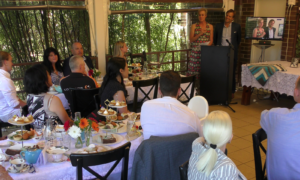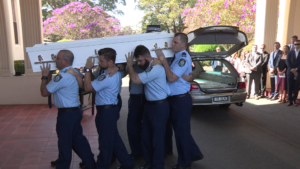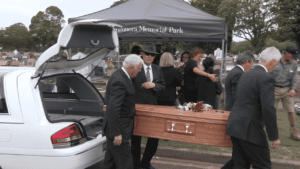The passing of a loved one is never easy.
Covid and all the related restrictions makes coping much more difficult.
Firstly, our sincerest condolences from Paul Sheaffe and Julia Williams.
Following the death of a loved one, you may encounter the following:
- Need to apply for compassionate and compelling exemptions to coronavirus travel bans: Check what documentation is required (proof hold a valid visa, proof of identity, birth/marriage certificates, letter from doctor explaining why travel is necessary, death certificate etc). N.B. one request per person.
- Within Australia https://health.gov.au has links to each states travel restrictions (scroll right down)
- Leaving Australia https://covid19.homeaffaris.gov.au – (click on ‘travel exemption portal’)
- You may be required to go into quarantine.
- Hospitals may further restrict visiting hours and numbers as well as having strict screening processes.
- Families may receive less support in palliative wards to help prepare them for what is to come. If in lockdown, there may also be limited support from family and friends.
- You may not be able to go and visit the person before they pass or attend the memorial service. If this is the case, try to organise some kind of video call, zoom or skype so at least you can see each other when you talk.
- The memorial service date may be rushed or delayed if an impending lockdown is on the horizon.
- The uncertainty around the pandemic’s rapidly changing conditions creates further anxiety.
For all of these reasons, you may need to reach out:
- Social worker at the hospital – great sources of information
- Your GP for a mental health plan to get a referral to a free counsellor/psychologist
- Life Line phone 13 11 14
- A counsellor that works online (Julia Williams Counselling, 0450 001 486)
Grief is a process
Coping with the death of a loved one is one of the most stressful events we go through. Dying during a pandemic can add to this, so self-care is vital. It begins with self-care and an understanding of mourning, which typically involves five stages. Although they are somewhat linear, you do go back and forth between the stages. Be gentle with yourself and others as they go through this process, as you will all do it in different ways and at different speeds. Grieving is a unique process. Embrace it. Express your emotions. Talk about how you feel. It’s a vital part of the process, even for men!
Again, counselling of some description may help you to process your grief and vent your anger/frustrations. Sometimes we can’t talk openly for fear it gets back to someone. Sometimes we’re ashamed of the thoughts we’re having, the way we’re blaming others, ourselves…. Journaling is another way to process things. Doing something physical, such as a vigorous walk/run can also be beneficial. Changing your physiology by moving has been proven to alter your emotional state. It allows the chemicals released when stressed to be broken down and it allows your body to produce the feel-good chemicals. A walk/run can also be a great escape, a chance to clear your head, take some time to get your head around things and, as a result, be better able to make decisions afterwards.
 1. Denial
1. Denial
The first stage is denial, which can result in a feeling of overwhelm or meaninglessness. (I can’t believe that he’s gone. The doctors had said he was recovering; I had no idea he was sick. He was so young, so fit, so healthy… His whole life was ahead of him. He was about to retire and we were about to set off on our adventure around Australia… This is all a bad dream. It can’t be happening.)
2. Anger
Next comes anger which may be targeted ‘logically’, at a doctor, the hospital, the Aged Care System, government red tape re visiting the person before they passed, the stupidity of the lifestyle choices they made, the unfairness of cancer… or you may just snap at a random person because you’re in so much pain. It is important to accept that anger is a HEALTHY and NECESSARY part of the process. Allowing it to be expressed helps you to heal more easily.
Having said that, the way we express anger can be unacceptable. Let it out by screaming into a pillow or punching it (with the flat of your forearm so you don’t break or sprain anything), journal, do something physical to dissipate the stress chemicals and release the feel-good chemicals. Move, even if it’s just to get a water, turn the TV off or go to the bathroom, even if you don’t need to. Move! It breaks the moment, diffuses the situation and changes your physiology. As you move, focus on breathing slowly and deeply. It calms you down and helps turn off the release of stress chemicals.
The anger can also be triggered by the financial mess you inherit, having to sell your home, having to return to work because you need the money but psychologically haven’t processed your grief… Then of course there’s the anger directed at other relatives, the ones that didn’t attend the live-streamed service, the ones that could have/should have… How dare they show up all teary now & want to contest the will! Is there even a will? Then there’s the well-meaning advice and offers to help remove all of your beloved’s stuff, thinking it will make things easier for you.
3. Bargaining
The next stage is bargaining, making some kind of deal concerning what you will give up to have just one more day, to swap places…
4. Depression
Next depression rears its head as you begin to move into the present and accept the reality, perhaps with a feeling of emptiness, as you begin to adjust to life without them, the loneliness, the loss of companionship, being surrounded by their possessions, photos, the bed you used to share, the clothes still in the wardrobe. You may have no idea of how to live your life without them. You might feel like your despair will go on forever, even though you know it’s not true. This is another necessary stage in healing.
5. Acceptance
Finally, there is acceptance of the new reality. You may resist for a while trying to keep the memories alive and hope that life as it was will return somehow return… Only at this stage can the final stage of readjusting to your new life truly begin. Remember here that you will keep going back into some of the stages of grief and that each person will have a unique experience of grief. It’s a normal part of the process as is getting upset when you hear a special song, drive past their favourite place… Special days such as birthdays, wedding anniversaries, Christmas will all be triggers too. Knowing that, be kind to yourself and others as you may all be a little bit emotional, perhaps a bit snappy, withdrawn, over-sensitive..
Beyond Blue recommends:
- Remember that grief is a natural and ongoing response to loss. It can be more pronounced in uncertain times such as these. Try not to be afraid of any emotion you experience.
- Grieve your way. No-one can tell you how to feel.
- Stay Connected. Seek support from people you trust through the use of phone and video calling technology.
- Say goodbye. Find quiet time to be alone and say goodbye to your loved one in your own way.
- Understand that a funeral during COVID-19 will be different. Try to focus on what you can control.
- Be prepared. There will be events and moments in the future that will trigger your memories and sadness. (Birthdays, special occasions, songs, places…)
- Understand that you will heal. In time, you will learn to live with your loss, heal and move forward in new and different ways.
Remember, there are organisations like:
- Life Line (phone 13 11 14 – they also have a messaging service if you are unable to talk)
- Beyond Blue (Corona Virus Support Line Phone 1800 512 348)
- Your GP can also organise free counselling in some cases
The Covid Service
With someone passing during a pandemic, there’s so much that’s out of your control. Focusing on that will just add to your pain so focus on the aspects of the service you CAN control and the positives such as the number of people who CAN physically attend and those that CAN attend the live-stream.
Funeral Video Live Streaming and Recording

Paul Sheaffe of Pauls Productions Funeral Video & Live Streaming Service is expert at live streaming funeral and memorial services, and can stream indoors or outside, even at the cemetery. Have you considered a graveside service? If you were unable to attend the actual service or see the live-streamed video at the actual time of the service, you are able to watch a high quality video recording of the service online a short time later.
Your Celebrant
Speak to your Celebrant and discuss ways to include people watching online. For example, Margie McCumstie from Metamorphis Ceremonies suggests for the celebrant to address the people online and to place flowers on the casket to represent them. If you are organising a live-streamed service, have a digital guest book which is a way for those people who cannot attend to communicate.
The Eulogy
Get assistance in preparing a eulogy which can encompass everyone- Love Legacy is a unique service in Australia that writes customised eulogies with a 48 hour turnaround. People that are unable to attend can send their eulogies or messages of condolence to the family.
The Wake

After the funeral service, organise a Zoom video wake/memorial service where you can come together and have an opportunity to share your sadness, shock, the good memories, the funny stories. It’s a way to all be together and see each other. This can be recorded by the person hosting the meeting and shared via the cloud. The recording arrives in your email box, and you simply forward it. Alternatively, you could have it professionally recorded, including personal messages to camera by those in attendance who wish to do so. Then this recording could go to make up the total keepsake video in remembrance of the loved one.
A Memorial Service
Plan a memorial service to honour your loved one after all the Covid restrictions have lifted and most of you can physically be together. So, for those who are still unable to attend, you could just cover it on ZOOM, and if you lack the confidence to do this, we could set it up for you. Alternatively, you may choose to have it professionally recorded, and live streamed to those who still cannot attend in person. Again, this could become part of your overall video keepsake album.
Your Personal Tribute

At some stage, find your own way to pay your respects. Choose something that reflects your relationship with the person. Go to a favourite shared place, a beach or a spot in the garden. Play a meaningful song. Read a poem. Light some candles or look up at the stars and say what you would have said if you had been able to attend. (My grandad would have loved me to watch the cricket while listening to barber shop quartets! I’ve attended a wake on a beach for a surfer attended by all those who couldn’t attend the service. Similarly, I’ve also had drinks in the local pub for a very social person who was always out and about.)
There’s no right or wrong way to do this. Just do what feels right for you. Sometimes, a lasting item is needed and Allison Ockenden from Today, Tomorrow & Always, creates beautiful jewellery and keepsakes that include DNA such as ashes or hair. A beautiful item can be created to honour your love and personal bond.
Support
If you need support to help you in coping, please feel free to contact our recommended counsellor, Julia Williams. You can message or call her to arrange a free 15-minute chat to find out more about what she can do and how Julia can help.
Reach out to those mentioned above to help you through this difficult period. All their contact details are here below.
How Do Children and Grandchildren Cope With The Loss of a Loved One?
Plesae see our separate article, Children and The Loss of a Loved One
Recommended Contacts:
Funeral & Memorial Service – Videographer/ Live Streaming
Five Good Reasons to Video Live Stream a Funeral Service After The Death of a Loved One

Pauls Productions Customised Video
- Paul Sheaffe
- https://paulsproductions.com
- paul@paulsproductions.com
Counsellor
Julia Williams
- (Graduate Diploma in Counselling)
- https://www.facebook.com/JuliaWilliamsCounselling
- Phone 0450 001 486
Funeral/ Memorial Celebrant
 Metamorphis Ceremonies
Metamorphis Ceremonies
- Margie McCumstie
- www.metamorphis.com.au
- www.facebook.com/MetamorphisCeremonies
- www.linkedin.com/company/metamorphis-ceremonies
- Call 0424 041212
- Email margie@metamorphis.com.au
DNA Artistry, Jewellery & Keepsakes
 Today, Tomorrow & Always
Today, Tomorrow & Always
- Allison Ockenden
- https://www.todaytomorrowalways.com.au
- Email: allison@todaytomorrowalways.com.au
Eulogy Writing Service
 Love Legacy
Love Legacy
- Margie McCumstie
- www.lovelegacy.com.au
- www.facebook.com/LoveLegacyEulogies
- Call 0424 041212
- Email margie@lovelegacy.com.au
Thankyou for reading. Please feel free to share this article with acknowledgement of the authors, contributors & Pauls Productions.









